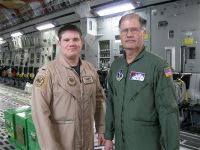ARLINGTON, Va. — Long duty days far away from home can be tough. A chance to speak with or see a loved one often can offer relief from the stresses of deployment. Ask almost any soldier, sailor, airman or Marine deployed overseas, and they will tell you that family and friends are always on their mind.
For one Air National Guard father-and-son duo, the Air Guard’s critical care air transport team mission offered them the opportunity to have this relief, if only for a moment.
“Having the opportunity to cross paths with my son was just an added bonus to the mission,” said Air Force Col. Charles Myers, state air surgeon for the Arkansas National Guard. “It was great to be participating in the same mission with someone who had grown up within my own Guard family.”
Myers’ son, Air Force 1st Lt. Brian Myers, a C‑17 Globemaster III pilot with the Mississippi Air National Guard’s 183rd Airlift Squadron, flew some of the missions in which his father had the opportunity to participate. The colonel said he was very proud to be working with his son on such an amazing mission, even though the lieutenant spent time in-flight inside of the aircraft cockpit.
“My son was about 5 or 6 years old when I first became involved with the Air National Guard,” said Colonel Myers, “so he kind of grew up with [the Guard].”
Lieutenant Myers said growing up with his dad was the inspiration and the drive that motivated him to join the Guard later in life.
“I took my first flying lessons in high school,” he said, “and I definitely knew that I wanted to be in the military [and] knew about the Guard and the Guard family, so it really influenced me when I was in college to enlist.”
For Brian, the opportunity to be a part of the critical care air transport team mission was a rewarding experience, one that was only made better by working with his father.
“I certainly was honored to be working on the mission with my dad, even though I was up in the front and he was in the back with the patients on board,” the C‑17 pilot said. “To be able to bring those wounded back is always a good feeling, but to do this with my dad was a great experience.”
Colonel Myers said the critical care mission is a great opportunity for the Air Guard and its airmen.
“Historically, the [Air National Guard] medical service has focused on the operational mission instead of specialty care, so most physicians in the [Air Guard] don’t get the opportunity to practice anything close to what their civilian specialty is.
The Air Guard has many such specialists, he added, so it’s able to provide certain specialties for the critical care air transport team mission.
The critical care teams augment the regular Air Force medical evacuation mission, which was designed to move stable patients, the colonel explained.
“However, in today’s world, we have those patients that have been stabilized, but are still critical and still need to be moved,” he added. “So basically, it is an intensive care unit in the air.”
Each team has a physician in a critical-care specialty, a critical-care nurse and a respiratory technician who can take care of this type of patient, the colonel said.
“Sometimes the duty hours can be long and the stresses of the environment can be hard to handle,” he said, “but being able to do this for our wounded service members is very rewarding.”
Source:
U.S. Department of Defense
Office of the Assistant Secretary of Defense (Public Affairs)

 von
von 